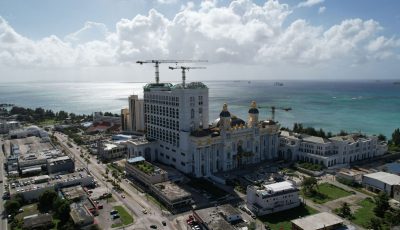Healthcare cost increases
The cost of healthcare has gone up between 20 and 50 percent, depending on medical services rendered at CHC. There’s serious concern in the community of the impact of new fees on stagnant family pocketbooks.
In my conversations with former speaker Oscar Rasa, we agreed that the imposition of new fees is untimely and a bit too hard for hardworking families whose income have stayed the same for more than two decades. This while they had to face increases of basic commodities over the same period.
Imagine how this would hit the 14,000-plus employees still struggling with poverty income level and below. Some may be Medicaid and Medicare recipients and health insurance for others. But everybody must still pay additional in his or her share of 20 percent during registration.
Coincidently, Biktot Hokog announced tidings of economic growth of some 28 percent. How much of this growth would find its way into salaries of the 14,000-plus employees earning measly poverty income and below? Would any of it be earmarked to subsidize healthcare cost at the most inopportune time? Would any of the elected elite return their recent 80-percent salary increase for hospital subsidy?
CHC funding: A certain law turns CHC into a semi-independent agency that includes self-financing. The latter didn’t materialize. Thus, for all intent and purposes, funding must return to the normal budgetary process. Did this ever occur to our supposed men-of-vision on the hill?
The health of our people is uppermost over other agency appropriations! CHC needs to be equipped with medical specialists, new equipment, supplies and ancillary staff. These require more than $5 million in breadcrumbs hurled at CHC annually.
The three essential departments are CHC, DOE, and DPS! The rest must contend with leftovers after the goodies are handed to these three areas. It’s called priority!
“We the people”: Rep. Ed Propst proposes an initiative to impose income tax on the casino joint here. It’s the right paradigm! However, how much tax is imposed should be left to financial and economic experts.
A blind figure without critically reviewing their implications could be devastating and detrimental to the NMI. Conventional wisdom says tax the rich. But when you impose too much tax against large firms, four things happen almost instantly: 1). Its dividends or level of profit sinks, derailing operations. 2. Raise the cost of products and services, passing it to consumers. 3). Cut staff salaries to meet new tax imposition. 4). Fire additional employees to save up for new taxes.
As such, there’s merit that the issue is walked through carefully. This isn’t one time to brave ignorance or non-expert advice. Even more importantly, policymakers must ensure they’re not lulled into complacency that temperamental growth is our savior. Take a step back and conduct critical ocular review of the issue at hand. Sink in your heels!
Moreover, would gain in temperamental growth withstand competition from Japan when she opens her casino industry and shuts visitors to the islands completely? If the single-engine tourism industry here crashlands in bankruptcy, is there anything else that would sufficiently provide the funds needed for public services?
Perhaps it would have been better if, from the initial stage, two or more casino licenses were approved. It would have prohibited the monopoly in everything that we see today.
Innovation: A visionary himself, Rasa strongly suggested that the NMI take heed of a recommendation by University of Guam president Robert Underwood that we embrace knowledge-based innovation industry. It is the wave of the future in wealth and jobs creation in the global community, Underwood noted, recently addressing Rotarians on Guahan.
He also noted that Guahan has relied on tourism and the military for five decades and it’s time to rein-in a third path or industry. It’s about instituting meaningful wealth creation that benefits our people via knowledge.
Former speaker Rasa said the “digital age necessitates mending traditional economics and technology.” However embryonic the concept may be, modern economies are increasingly based on knowledge and information.
“Knowledge is now recognized as the driver of productivity and economic growth, leading to a new focus on the role of information, technology and economic performance,” according to a study by the Organization for Economic Cooperation and Development.
A policy down this path should enable innovations that create wealth and jobs in meaningful and efficient ways for the islands beyond the fickle single-engine economy like tourism, Rasa noted. Indeed, the islands are too small for any midsize or heavy manufacturing and it makes sense that knowledge-based innovations are explored to the hilt. Even China has moved away from manufacturing.
The NMI has to forge ahead so it understands “the dynamics of the knowledge-based economy and its relationship to traditional economics. Expanding knowledge and its transmission through communications and computer networks has led to the emerging ‘information society.’”
The study further points out, “The need for workers to acquire a range of skills and to continuously adapt these skills underlies the learning economy. The importance of knowledge and technology diffusion requires better understanding of knowledge networks and national innovation systems.
“Most importantly, new issues and questions are being raised regarding the implications of the knowledge-based economy for employment and the role of governments in the development and maintenance of the knowledge base.” The rich in Asia have begun moving away from traditional investments.
Accolades: In this connection, the Public School System and NMC deserve the accolades of our community for venturing into teaching our children the use of computers and digital technology. PSS starts them early in exemplary fashion. By the time they clear high school, most, if not all, would be computer literate.



























